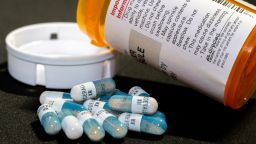Prescriptions for stimulants often used to treat attention-deficit/hyperactivity disorder surged during the pandemic, especially among adults, a new study found.
The finding comes as one common ADHD treatment, Adderall, has been in shortage for months, in part because of high demand.
Diagnoses for ADHD have become more common in recent decades, and prescriptions for stimulant drugs that are most often used to treat the neurodevelopmental disorder have also been on the rise. But the new report from the US Centers for Disease Control and Prevention highlights a recent surge in demand for the drug and others like it.
Between 2016 and 2020, the share of the population that had filled a prescription for a stimulant drug held relatively steady. But there was a large increase in 2021, with prescription fills jumping more than 10% across most age groups.
Overall, the CDC analysis of private insurance records shows that more than 4% of people ages 5 to 64 had filled a prescription for a stimulant in 2021, up from 3.8% in 2020. The vast majority of people who are prescribed stimulant medications have an ADHD diagnosis or are being treated for symptoms of the disorder.
ADHD is typically identified in childhood and has been more prevalent among boys, and the CDC analysis found that stimulant prescriptions were consistently most common among boys ages 5 to 19.
However, the largest annual increases in 2021 were among adults, especially women in their 20s and 30s.
There are well-established clinical guidelines for ADHD care for children and adolescents, with an outline of symptoms that show a persistent pattern of inattention or hyperactivity-impulsivity. While there is growing recognition of ADHD in adults, a comparable playbook for adults does not exist.
The gap in guidance for adults is a public health concern in part because of the “general inadequate access to mental health providers trained to diagnose and manage ADHD,” according to the researchers.
“Development of clinical recommendations for diagnosing and managing adult ADHD could help guide safe and appropriate stimulant prescribing,” they wrote.
While stimulants can offer “substantial benefits” for people with ADHD, there are also potential harms including misuse and overdose. Nearly 33,000 people died from an overdose involving a psychostimulant in 2021, CDC data shows. Methamphetamine is primary drug involved, but deaths have nearly doubled since 2019.
The sharp rise in prescriptions for stimulants during the pandemic also raises questions about the role of telehealth.
Expanded access to telehealth during the pandemic could have removed barriers and encouraged more people to seek care, especially during a time when mental health struggles were exacerbated.
But it also could have introduced greater potential for inadequate evaluations or inappropriate stimulant prescribing, according to the researchers.
“Evaluation of policies enacted during the pandemic could identify benefits and harms of those policies,” they wrote.
Get CNN Health's weekly newsletter
- Sign up here to get The Results Are In with Dr. Sanjay Gupta every Tuesday from the CNN Health team.
Some people who use stimulants for ADHD have struggled for months to fill their prescriptions.
The US Food and Drug Administration announced a shortage of Adderall on October 12, 2022. The agency noted that it was in communication with all manufacturers of amphetamine mixed salts and that one of those companies was “experiencing ongoing intermittent manufacturing delays.” Although other manufacturers continued to produce the drug, the agency said, “there is not sufficient supply to continue to meet U.S. market demand through those producers.”
Jim McKinney, a spokesperson for the agency, told CNN last month that the manufacturing delay has been resolved and that the shortage is now “demand-driven.”
On its website, the FDA lists eight manufacturers that have reported Adderall shortages to the agency. The website lists the shortage reason for some versions of the drug, such as “demand increase” or “shortage of active ingredient,” but for other versions, it just says “other” or lists no reason at all.


